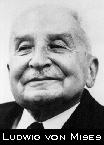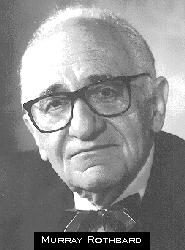

 Major Characters: Carl Menger, Ludwig von Mises, F. A. Hayek, Murray
Rothbard
Major Characters: Carl Menger, Ludwig von Mises, F. A. Hayek, Murray
RothbardECON 364 – Topic Nine
Austrian Economics - Part One
Mostly From "Austrian Economics" by Deborah Walker
in the The Fortune Encyclopedia of Economics, ed. by David R. Henderson
and other sources, including your reading assignment:
"The Use of Knowledge in Society" by F. A. Hayek


 Major Characters: Carl Menger, Ludwig von Mises, F. A. Hayek, Murray
Rothbard
Major Characters: Carl Menger, Ludwig von Mises, F. A. Hayek, Murray
Rothbard
What are the major cornerstones of the Austrian School?
Subjectivism, Individualism, Uncertainty, Processes vs. End States
METHODOLOGY: Why are they "radical" - not in the mainstream?
Praxeology is the distinctive methodology of the Austrian school - praxeological economics is the structure of logical implications of the fact that individuals act.
Praxeology rests on the fundamental axiom that individual human beings act, that is, on the fact that individuals engage in conscious actions toward chosen goals.
This concept of action contrasts to purely reflexive, or knee-jerk, behavior, which is not directed toward individual goals.
Uncertainty: People act under uncertainty - they don't have perfect information and can and do make mistakes. The are influenced by the meaning they give to institutions, but are not completely controlled by them -- they still choose in the true meaning of the word.
Therefore: axiomatic-deductive method is used by Austrians.
Axiom:
Deduction:
What does methodological subjectivism mean? What does methodological individualism mean?
Individual's values, knowledge and understanding of history, of the physical world and the way it works, expectations, plans of action, etc. are the individual's own and may be and often are different from those of others.
Only individuals act -- and we study human action as economists. Only individuals have purposes.
The Facts of the Social Sciences vs. the Natural Sciences
The facts of the natural sciences are objective. They are independent of the object being observed and the subject observing them. That is both why experiments in the natural sciences can be replicated in all relevant details and why exactly replicated experiments yield results that are the same in all relevant details.
The facts of the social sciences are subjective. The are not independent of the subjective actor or the subjective observer.
So what is relevant to an individual's action and to another individual's understanding of that action is not the physical reality surrounding the actor and the action, but the subjective perceptions of that reality.
So human beings act purposefully - they wish to attain goals. Since they wish to attain these goals, they must be valuable to them; accordingly they must have values that govern choices. These values are subjective to the individual.
Processes vs. End States
All action in the real world, furthermore, must take place through time; all action takes place in some present and is directed toward the future (immediate or remote) attainment of an end. If all of a person's desires could be instantaneously realized, there would be no reason for him to act at all - and all action would stop.
But this is not the case -- action continues - change takes place.
Why do Austrian economist not limit themselves to mathematics?
Math cannot capture a) subjectivism, b) change, c) uncertainty.
What is the most important economic problem people face, according to Austrian economists? Why?
Efficiency: Why does the Austrian say that we cannot "speak of efficiency outside of the individual?"
So what do Austrian economists do? How and why do they focus on "institutions."
Economics is the study of the systematic, but unintended consequences of human action.
Adam Smith's “invisible-hand explanation” - in a market economy people sometimes act as though guided by an “invisible hand.”
The Concept of Spontaneous Order (Hayek): "The Result of Human Action, but not of Human Design"
An unintended or not designed regularity in society is a “spontaneous order.”
Examples: Elevator etiquette, paths across grass AND Capitalism and civilization are examples of unintended consequences.
Civilization improved the lot of humanity; people were poor in the state of nature (died a lot).
Civilization was an unintended consequence of human action. It was not invented.
This is why Austrians understand the importance of unintended social norms - especially in a free society. Buchanan example:
By “capitalism” I mean voluntary exchange plus individuals acting purposefully to decrease a "felt uneasiness" - better their lives.
Capitalism produced a great expansion of wealth in the world.
Capitalism, too was an unintended consequence of human action. It was not invented.
Spontaneous orders have three "distinguishing properties":
1.
2.
3.
Macro Examples: Money and Markets as "Spontaneous Orders"
Money:
Markets Economic Growth - Capital, Subjective Value, Imputation, Institutions, Process, Coordination
THE HAYEKIAN TRIANGLE